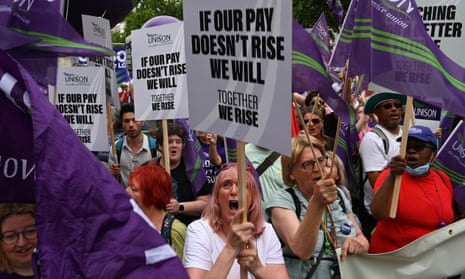Union leaders have derided calls by government ministers for wage restraint, believing their members must close the gap with rising inflation or risk a severe cut in living standards.
One of the main reasons cited by officials in the Bank of England and the Treasury for wage restraint is the threat of a wage/price spiral and the fear that this ratcheting effect will make double-digit inflation a longstanding feature of life in the UK.
There are 32.7m people in employment in the UK, and if all of them receive pay rises that match the current inflation rate of 9%, it will prove to be a crippling bill for employers, including local and central government. Figures published on Wednesday could show the consumer prices index (CPI) heading closer towards the BoE forecast of 11% in October.
The wage/price spiral is an academic concept based on a theory of inflation expectations. A string of papers by economists in the 1960s and 1970s, when inflation was thought to be a constant threat, argued that once households expect inflation to be high for the foreseeable future, they will demand higher wages. Businesses will be forced to pass on the cost of higher wages, which will create a second round of rising prices.
With higher wages chasing higher prices, the concern is that soon the country will find itself, if not with 1,000% hyperinflation, then with a level of wages that makes most British exports unaffordable in foreign markets.
However, the concept of inflationary expectations is based on a theory rather than empirical evidence. And it stems from an era when workers, a large number of them working in state-owned industries, had a good deal more power than they enjoy today.
In 1975, when inflation hit 25%, wage rates for manual workers jumped at an annual rate of 31.7% while average earnings for all employees rose by about 28% a year. Stemming from the 1974 oil shock, the price spike was felt more keenly in Britain’s open economy than elsewhere. Inflation in France in 1975 was 12.7% and 6.7% in Germany.
But earnings were already falling behind inflation by 1976 and continued to do so for the rest of the decade.
Negotiated pay rises are currently running at about 4%, up from 3% at the beginning of the year. The Office for National Statistics says average pay growth without bonuses is 4.2% in April, less than half the 9% inflation rate. Only bonuses allow workers to get near bridging the gap with inflation and they are unevenly distributed, with most on offer to staff working in the City, IT professionals, lawyers, accountants and construction workers.
Tony Wilson, head of the Institute for Employment Studies, said: “There is little sign so far of a wage/price spiral, but some indications that private-sector services are raising pay in response to a tighter labour market.”
The response to labour shortages should not be higher interest rates, he added, but greater effort from ministers to encourage those who have quit jobs to rejoin the labour force.
Another difference with the 1970s is the level of financial support on offer from the government. Pensioners and workers on low incomes with families have been largely protected from rising prices by Rishi Sunak’s recent rescue package, according to the Institute for Fiscal Studies.
It means they do not need to ask for a pay rise that matches inflation to maintain their standard of living. This is likely to prove a conundrum for unions currently debating whether to follow the railway workers in striking.
If the £650 boost to universal credit this year and other measures that amount to more than £1,000 for many households allow them to cope with higher energy and food bills, what is the financial and emotional drive behind demands for a double-digit wage rise?
